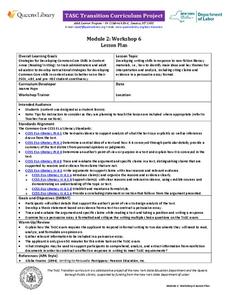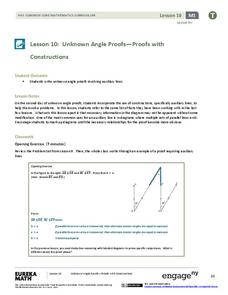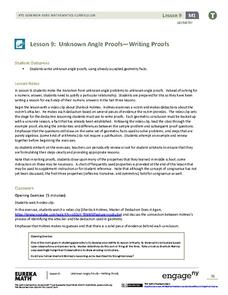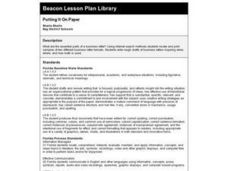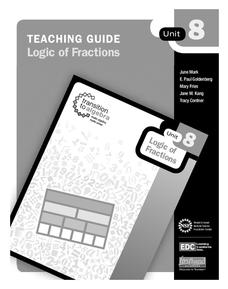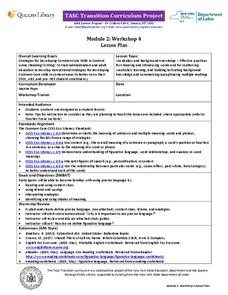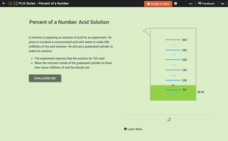Child Care Lounge
How Many Spots are on Each Ladybug?
The ever popular ladybug serves as a excellent tool for developing the number sense of young mathematicians on this math learning exercise. Presented with a series of colorful pictures, children practice counting and writing the numbers...
EngageNY
TASC Transition Curriculum: Workshop 6
Is a college education necessary for success in today's world? The class investigates the question, along with others at the end of the sixth workshop in a 15-part series. The instructional activity has four parts with multiple...
New York State Education Department
TASC Transition Curriculum: Workshop 10
How have educational standards evolved? Educators of adults examine expectations in the 10th workshop out of 15 to better determine how standards have grown. Participants respond to a variety of sample questions to determine how they...
EngageNY
TASC Transition Curriculum: Workshop 8
Lights, camera, action! Math educators consider how to improve their instruction by examining a model of the five-practice problem-solving model involving a movie theater. Participants examine cognitive demand in relation to problem...
EngageNY
TASC Transition Curriculum: Workshop 15
What do a cheetah, Audi commercial, and air have in common? They're all topics of an engaging inquiry-based, hands-on workshop for educators about background knowledge, reading strategies, the CER model, and argumentative writing. The...
EngageNY
Unknown Angle Proofs—Proofs with Constructions
Provide your emerging mathematicians with the tools to learn as they incorporate auxiliary lines to solve unknown angle proofs in this continuing segment. They decipher information from a diagram to uncover the missing pieces and...
EngageNY
Modeling with Polynomials—An Introduction (part 1)
Maximizing resources is essential to productivity. Class members complete an activity to show how math can help in the process. Using a piece of construction paper, learners construct a box with the maximum volume. Ultimately, they...
Curated OER
Backwards Writing: Reflections and Symmetry
Why is "ambulance" written backwards on emergency vehicles? Young geometers apply principles of symmetry to translate words written backwards. See if your school or district subscribes to Jobland, where you can view a clip that explains...
New York State Education Department
TASC Transition Curriculum: Workshop 11
You'll C-E-R a difference in classroom achievement after using a helpful lesson plan. Designed for economics, civics, government, and US history classes, participants practice using the CER model to craft arguments about primary and...
Virginia Department of Education
Types of Variations
Scholars determine how two quantities vary with respect to each other. They complete a fill-in-the-blank activity by stating whether the entities vary directly, inversely, or jointly, create equations that match different variations, and...
Curated OER
Number Writing Poems
Students read the short poem for each number to help them with number formation. In this numbers lesson plan, students follow directions of the poems.
New York State Education Department
TASC Transition Curriculum: Workshop 5
Are video games sports? Pupils investigate this question as well as various nonfiction selections to learn more about claims and the support that defines them. All of the selections mimic the rigor on state tests and encourage close...
EngageNY
Unknown Angle Proofs—Writing Proofs
What do Sherlock Holmes and geometry have in common? Why, it is a matter of deductive reasoning as the class learns how to justify each step of a problem. Pupils then present a known fact to ensure that their decision is correct.
Coloring Squared
Memorial Day Soldiers
Practice division and celebrate Memorial Day with a color-by-number problem solving instructional activity. The final picture includes a group of Memorial Day soldiers.
Curated OER
Putting it On Paper
Learners locate and print samples of two different business letter formats. They write rough drafts of business letters inquiring when, where, and how math is used.
Education Development Center
Logic of Fractions
Before diving into operations with fractions, learners discover the foundation of fractions and how they interact with one another. Exactly as the title says, logic of fractions is the main goal of a resource that shows pupils how...
Curated OER
In the Right Order
What comes first? Practice order of events with this sequencing activity. Learners examine two sets of pictures and write 1st, 2nd, and 3rd beneath the corresponding pictures. Encourage them to explain their reasoning, as there may be...
Curated OER
Preparation and Transition to Two-Column Proofs
Students investigate proofs used to solve geometric problems. For this geometry lesson, students read about the history behind early geometry and learn how to write proofs correctly using two columns. The define terminology valuable to...
New York State Education Department
TASC Transition Curriculum: Workshop 4
Why is it important to use precise language? Participants explore this question in the fourth activity in a series of 15 on effective instruction. Perfect for all content areas, the activity promotes appropriate language choice through...
CK-12 Foundation
Percent of a Number: Acid Solution
Mathematicians answer five questions about percents, ratios, and proportions with help from an interactive graduated cylinder. Question types include multiple-choice, fill-in-the-blank, and discussion.
Curated OER
The Random Walk
Deep mathematical thinking is found with just a coin and a number line. Combining computing some probabilities in a discrete situation, and the interpretation of a function, this simple task gives learners a lot to think about on...
Coloring Squared
Baseball Player Mystery Puzzle
After solving each multiplication sentence square, pupils color the numbers according to the key. What does the mystery picture make? Class members take a swing at problem solving to find out.
Curated OER
Fraction Fun With Food
Learners use candy and pizza to identify concepts associated with fractions. They work together in groups to create fractions. They complete a worksheet individually to complete the activity.
EngageNY
TASC Transition Curriculum: Workshop 12
How can opinions slant facts? Workshop participants learn how to examine primary and secondary sources and identify the author's point of view. They also examine how visual art impacts the meaning and rhetoric of sources. Full of...

